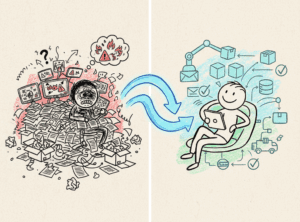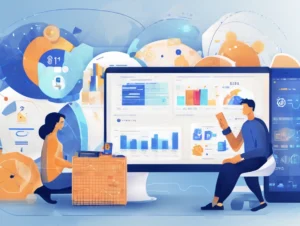The Five Core Areas of E-Commerce Excellence
1. Marketing Expertise
This means understanding how digital marketing actually works and how traffic needs to be driven. A solid E-Commerce professional can hold marketing teams or external agencies accountable because they understand the mechanics behind customer acquisition.
They know the difference between channels that drive awareness versus those that convert, can read campaign data objectively, and understand which metrics actually matter versus vanity numbers. They can spot when an agency is optimizing for the wrong goals or when internal teams are chasing shiny objects instead of revenue.
2. Sales Acumen
E-Commerce is still commerce. The best professionals understand the psychology of online buying, can optimize conversion paths, and know how to turn browsers into buyers. They think like customers, not just marketers.
This means understanding everything from product positioning and pricing strategy to checkout flow optimization. They see the whole funnel, not just their piece of it, and can identify where prospects are dropping off and why.
3. Technical Knowledge
You don’t need to be a developer, but you absolutely need to understand how the pieces fit together. Platform capabilities and limitations, integration challenges, data flows, and the reality of what’s actually possible with your current setup.
The best E-Commerce professionals can have intelligent conversations with developers and agencies without getting lost in technical jargon or making promises the technology can’t keep.
4. Operational Excellence
This is where the rubber meets the road. Inventory management, fulfillment processes, returns handling—all the unglamorous stuff that makes or breaks the customer experience.
Great E-Commerce professionals understand that you can have the best marketing in the world, but if you can’t deliver the product on time or handle a return smoothly, none of it matters.
5. Customer Experience Focus
This goes beyond just being “customer-friendly.” It’s about understanding the entire customer journey from first touchpoint through post-purchase support and retention. They know how each decision impacts the customer experience and can balance business needs with customer satisfaction.
They understand that customer experience isn’t just the support team’s job—it’s woven into every aspect of the operation, from site speed to packaging to follow-up communications.
The Five-Area Scoring System
Here’s how I evaluate E-Commerce talent:
- 5 Areas Strong – You’ve found a unicorn. These people are extremely rare and worth whatever it takes to keep them.
- 4 Areas Strong – You’ve got a keeper. Still rare and incredibly valuable.
- 3 Areas Strong – Pretty great. They can learn the missing areas or you can supplement with team members or partners.
- 2 Areas Strong – Not bad, but they need more development time and support.
- 1 Area Strong – They need more time in the trenches before they’re ready for significant responsibility.
The key insight? It really is a big mix. Very few people excel in all five areas naturally, which is why building a strong E-Commerce operation often requires either exceptional individuals or well-rounded teams.
Experience Matters—But Not How You Think
Big Company vs. Small Company Experience
I once worked with someone who had an impressive background at one of the huge retailers. The higher-ups were impressed, but when it came down to execution, he was one of the least savvy people I knew. Why? At big companies, you often have massive teams, unlimited budgets, and highly specialized roles. You can coast on the company’s resources and reputation.
Time in the Trenches
There’s no substitute for hands-on experience dealing with real problems. The professional who’s personally handled inventory sync issues, managed a site crash during Black Friday, or figured out why conversion rates suddenly dropped—that’s someone who understands the reality of E-Commerce operations.
Look for people who can tell specific stories about problems they’ve solved, not just strategies they’ve implemented.
The Learning Mindset Factor
Data Objectivity
Eagerness to Learn
Problem-Solving Under Pressure
Self-Accountability
They’re willing to point the finger back at themselves when they find an issue. We all make mistakes, and we’re lifelong learners. It’s not about not making mistakes or less-than-perfect decisions, but how fast you identify them, act objectively to fix them, and move on.
This trait separates the truly great from those who deflect blame or make excuses when things don’t go as planned.
Red Flags to Watch For
Based on my experience evaluating E-Commerce talent, here are the warning signs:
- Buzzword overload – If they can’t explain their strategy in simple terms, they probably don’t understand it themselves.
- Vague answers – When you ask specific questions about results or challenges, they deflect with generalities.
- No failure stories – Everyone fails sometimes. If they can’t discuss what didn’t work and what they learned, they’re either lying or not reflective.
- Platform obsession – They’re convinced that switching platforms will solve all problems (it rarely does).
The Reality Check
The harsh truth is that truly great E-Commerce professionals are rare because the skill set is so diverse. You need analytical thinking, creative problem-solving, technical understanding, operational discipline, and customer empathy—all while staying business-minded.
Building Your E-Commerce Dream Team
If you can’t find that unicorn five-area professional (and most of us can’t), focus on:
- Identifying your biggest gaps – Where do you need the most help right now?
- Hiring for learning ability – Someone strong in two areas who’s eager to develop the others is often better than someone who’s mediocre across all five.
- Building complementary teams – Pair a marketing-strong person with someone who’s operationally excellent.
- Working with specialized partners – Sometimes it’s better to have trusted partners handle specific areas while you focus on overall strategy and coordination.
The key is honest assessment—of both your needs and your candidates’ real capabilities, not just their impressive presentations.
E-Commerce is still evolving, but the fundamentals of what makes someone truly effective remain surprisingly consistent. Look for the five core areas, value real experience over resume glamour, and prioritize learning mindset over current knowledge.





